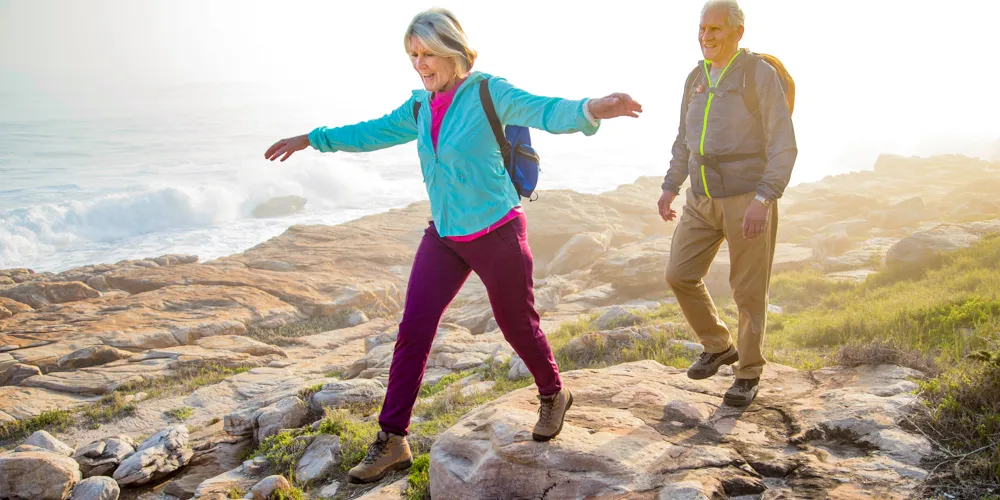The physical, mental, and emotional benefits of hiking are transformative. Whether you’re venturing into a national park or exploring local trails, hiking is a full-body activity that fosters wellbeing, fitness, and resilience. People of all ages can enjoy the benefits of hiking while soaking in the beauty of nature and improving their overall health. This comprehensive guide from The National Park explores the top reasons to embrace hiking as a core component of your lifestyle.
Beyond just exercise, the benefits of hiking include improved cardiovascular health, better mental clarity, and enhanced immune function. As more people look for natural ways to combat stress and boost their physical performance, hiking has become a go-to solution. Let’s delve into the many benefits of hiking and how it can elevate your everyday life.
Stress Reduction: Nature’s Therapy
One of the most celebrated benefits of hiking is stress relief, which stems from its unique ability to simultaneously engage the body and quiet the mind. Immersing yourself in natural landscapes not only calms the nervous system but also helps lower cortisol, the hormone associated with chronic stress. Scientific studies have confirmed that hiking in green environments can reduce rumination, the repetitive negative thinking linked to anxiety, depression, and even cardiovascular issues. These emotional and physiological shifts often leave hikers feeling more grounded, uplifted, and emotionally balanced.
To make the most of the calming benefits of hiking, bring along tools that support mindfulness and comfort. Noise-canceling earbuds paired with nature-based meditation playlists can deepen your mental reset. Products like lightweight hammocks from Wise Owl Outfitters, insulated hydration packs from Osprey, or compact camp chairs from Helinox create an inviting pause point along the trail. These affiliate-recommended items enhance the meditative benefits of hiking and transform any outing into a therapeutic retreat for body and mind.
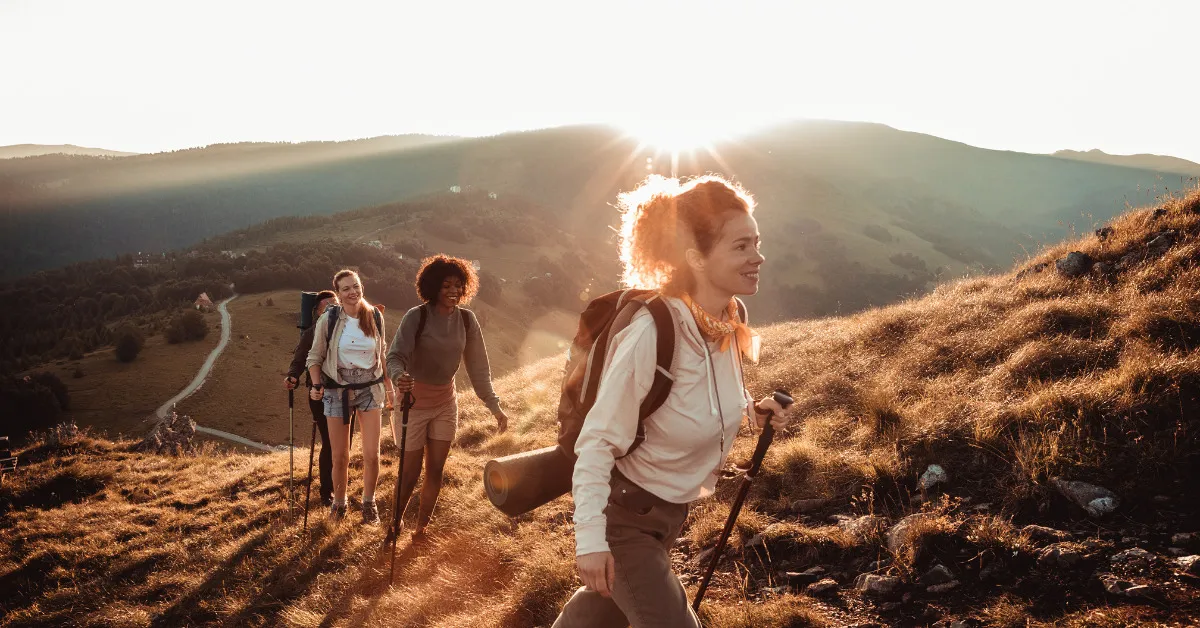
Improved Focus and Concentration
Another one of the powerful benefits of hiking is enhanced cognitive function, as it requires continuous mental engagement with your surroundings. Navigating unfamiliar trails activates regions of the brain involved in spatial orientation, problem-solving, and memory retrieval. Research has shown that spending time in nature can improve cognitive flexibility, reduce mental fatigue, and even enhance creativity. For children and adults alike, regular hikes have been linked to improved attention span and reduced symptoms of ADHD, offering a drug-free method to support cognitive health.
To fully experience the mental clarity benefits of hiking, it helps to minimize distractions and stay organized. Lightweight backpacks with ergonomic support from affiliate partners like Deuter or Gregory help reduce physical strain, allowing your mind to focus. Additionally, journals or digital voice memos can be useful for capturing creative thoughts sparked by trail time. Whether you're a student tackling exams, a professional looking to reduce burnout, or a writer seeking inspiration, the cognitive benefits of hiking offer a natural and enriching boost to mental performance.
>> Read More: Hiking vs Walking: Understanding the Difference Between Them
Build Strong Muscles & Bones
Among the long-term benefits of hiking is the comprehensive strengthening of your musculoskeletal system, which plays a crucial role in mobility, posture, and overall physical resilience. Hiking activates a broad range of muscle groups, including the glutes, quadriceps, hamstrings, calves, and core stabilizers. These repeated, low-impact movements not only build muscular endurance but also enhance functional strength used in daily activities. As a weight-bearing exercise, hiking stimulates bone remodeling, which increases bone density and significantly reduces the risk of osteoporosis and age-related fractures.
To support these structural benefits of hiking, affiliate-recommended gear can make a substantial difference. Trekking poles from trusted brands like Black Diamond or Leki reduce joint strain while enhancing muscle engagement during uphill and downhill segments. Wearing high-traction, anatomically supportive hiking boots from Merrell or Salomon helps align the ankles and knees properly, preventing injury and improving trail performance. These footwear and mobility tools optimize biomechanics, allowing you to fully realize the physical benefits of hiking while promoting longevity in your active lifestyle.
Improve Your Balance
One of the underrated benefits of hiking is its profound impact on proprioception, your body’s innate ability to sense movement, action, and location. Hiking on variable terrain stimulates the central nervous system and requires continuous adjustments to posture and footing, thereby improving neuromuscular coordination, reflex timing, and kinesthetic awareness. Over time, this strengthens the small stabilizing muscles in the ankles, knees, and hips, enhancing balance and reducing the risk of falls, particularly in aging populations.
To support these biomechanical benefits of hiking, consider footwear that encourages natural foot motion and sensory feedback. Low-profile trail shoes or minimalist barefoot-style runners enhance ground feel and agility while strengthening intrinsic foot muscles. Affiliate-recommended picks such as the Altra Lone Peak or Vivobarefoot Primus Trail shoes combine comfort, flexibility, and trail-readiness, helping you unlock the full neuromuscular benefits of hiking with every step.
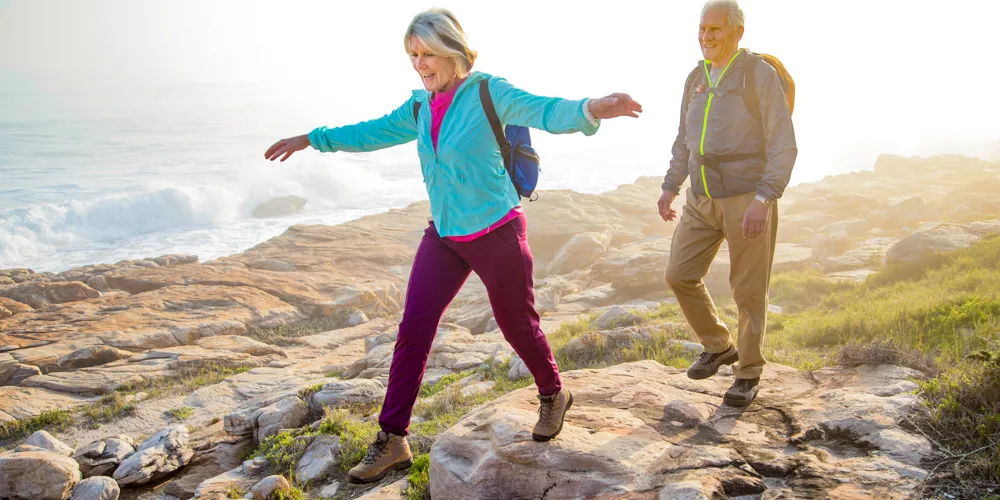
>> Read More: The 19 Best Hiking Trails in the US: Perfect for Adventure
Get Better Sleep
Thanks to its unique combination of physical exertion, exposure to daylight, and mental decompression, one of the most restorative benefits of hiking is its positive impact on sleep quality. Time spent outdoors helps recalibrate the body’s internal clock, also known as the circadian rhythm, which governs sleep-wake cycles. Simultaneously, the physical effort of hiking reduces tension and promotes endorphin release, preparing both body and mind for deeper rest. Numerous hikers report quicker sleep onset, fewer awakenings during the night, and more restorative slow-wave sleep following a day on the trail.
To extend the sleep-enhancing benefits of hiking, focus on recovery tools that support relaxation and physiological wind-down. Weighted blankets from brands like Bearaby can stimulate deep pressure touch, mimicking a comforting hug and encouraging serotonin production. Magnesium supplements from Calm or Nature Made support muscle relaxation and nervous system function. Eye masks, herbal teas, and essential oil diffusers are also affiliate-friendly products that contribute to a restful post-hike evening routine, reinforcing one of the most long-lasting benefits of hiking: better sleep.
Build Your Endurance
A major physical benefit of hiking is its ability to build cardiovascular and muscular endurance, making it a foundational exercise for long-term fitness. As your body adapts to increasingly challenging trails, you train your heart to pump more efficiently, your lungs to process oxygen more effectively, and your muscles to handle sustained effort over time. This translates to increased stamina, lower resting heart rate, and greater metabolic efficiency, all of which are vital for maintaining energy throughout the day. Moreover, hiking strengthens slow-twitch muscle fibers, which are key for endurance sports and daily physical tasks.
If you're working toward a fitness goal, consider integrating performance-tracking tools to quantify progress and stay motivated. GPS-enabled smartwatches or fitness trackers from affiliate brands like Garmin, Coros, or Suunto offer heart rate monitoring, elevation gain stats, and recovery metrics tailored for hikers. These digital tools transform the benefits of hiking into actionable insights, allowing you to see improvements in stamina and endurance with each trek. Over time, you’ll not only extend your trail mileage but also build the physical and mental resilience that carries into every area of life.
Cross Train For Other Sports
The benefits of hiking also extend to athletes in other disciplines by offering a low-impact, high-reward method of improving overall performance. Hiking strengthens stabilizing muscles, promotes joint integrity, and increases cardiovascular endurance without the repetitive stress associated with running on pavement or lifting heavy weights. It also introduces varied terrain and elevation that challenge balance and coordination, crucial for multi-sport athletes. As a result, many runners, cyclists, swimmers, and climbers incorporate hiking into their routines to reduce injury risk and enhance functional strength.
To get the most out of hiking as a cross-training tool, athletes can use weighted vests to simulate resistance or resistance bands to engage accessory muscle groups mid-hike. These portable tools, available from trusted affiliate brands like Hyperwear and TRX, are ideal for making ascents more challenging and strengthening the posterior chain. Footwear designed for trail agility and moisture-wicking technical apparel further supports this training modality. With the right approach and gear, the cross-disciplinary benefits of hiking can elevate any athlete’s endurance, recovery, and movement quality.
>> Read More: 7+ Hiking Safety Tips in National Parks: How to Best Prepare
Combats Diabetes
Among the metabolic benefits of hiking is its scientifically supported ability to regulate blood glucose levels and enhance insulin sensitivity. As a form of sustained aerobic activity, hiking encourages muscle cells to uptake glucose more efficiently, helping to manage or reduce the risk of type 2 diabetes. This effect is further amplified by the varied intensity of hiking, which alternates between moderate and vigorous exertion, a pattern shown to optimize metabolic control. Additionally, being active in nature reduces stress, which in turn lowers cortisol levels that can otherwise spike blood sugar.
To support metabolic health during your hike, individuals managing diabetes may benefit from continuous glucose monitors (CGMs) like FreeStyle Libre or Dexcom, which provide real-time data and alerts. These devices, available through affiliate medical tech providers, can be paired with smartwatches or phones for discreet monitoring. Carrying hydration packs with electrolyte-balanced water and packing low-glycemic index snacks, such as almonds, jerky, or apples, can help keep blood sugar stable. When approached with care and preparation, the glucose-regulating benefits of hiking offer a safe, natural complement to traditional diabetic management strategies.
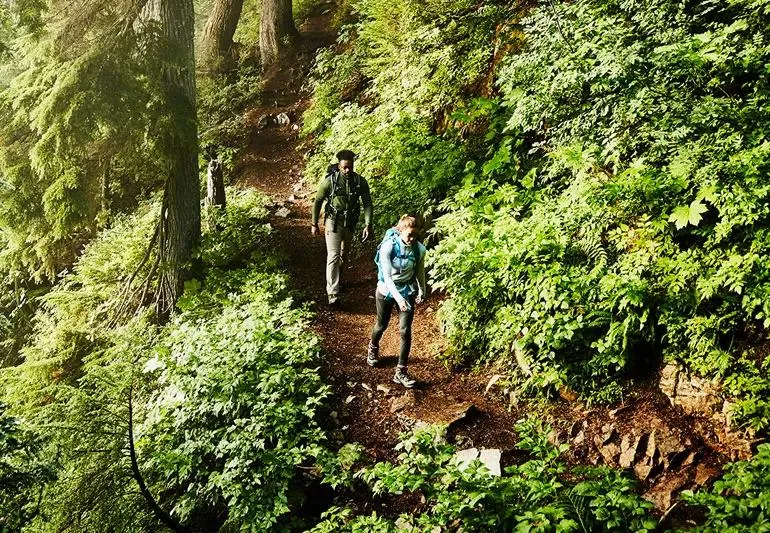
Tackles Obesity
Weight loss is one of the most visible benefits of hiking, driven by its combination of aerobic conditioning, muscle activation, and sustained energy expenditure. A moderate 1-hour hike can burn anywhere between 400 to 700 calories, depending on terrain, incline, body weight, and backpack load. Unlike monotonous gym workouts, hiking introduces variety and natural stimulation, which keeps both the mind and body engaged. This immersive experience helps build exercise consistency, a critical factor in achieving long-term weight management.
To track progress effectively, affiliate-recommended apps like MyFitnessPal, Noom, or Fitbit help users log calories burned, food intake, and step counts with precision. High-performance hiking apparel from brands like Prana, Outdoor Voices, or Arc'teryx can further enhance comfort, thermoregulation, and mobility during your hikes. These tools and clothing choices reinforce the physical and behavioral benefits of hiking, making it easier to maintain a healthy routine without the burnout often associated with traditional fitness programs.
Reduces Anxiety and Depression
Mental health is a crucial domain where the benefits of hiking truly shine, providing a natural and accessible way to improve emotional resilience and psychological well-being. Exposure to sunlight during hikes stimulates serotonin production, a neurotransmitter known to elevate mood and support a balanced emotional state. Additionally, the rhythmic, bilateral movement of walking, especially in natural environments, has meditative effects that calm the nervous system, reduce heart rate, and promote mindfulness. Scientific studies increasingly support the notion that nature-based movement can significantly lower cortisol levels and alleviate symptoms of anxiety, seasonal affective disorder (SAD), and mild to moderate depression.
To enhance these therapeutic benefits of hiking, consider incorporating mood-boosting gear into your routine. Bluetooth speakers designed for outdoor use allow hikers to enjoy calming playlists or nature soundtracks, while aromatherapy roll-ons infused with lavender or citrus can reduce stress and promote alertness. Affiliate-recommended brands such as Saje Wellness, Bose, or JBL offer high-quality options that integrate wellness and technology. Ultimately, the mental health benefits of hiking go beyond temporary distraction, they foster deep reconnection with self, place, and purpose.
>> Read More: 11 Best Winter Hiking Trails In The USA for Explorers
Enhance Connection with Nature
One of the most profound benefits of hiking is the development of spiritual awareness and environmental consciousness. Immersing yourself in nature helps shift focus away from material possessions and digital distractions, fostering a sense of presence and interconnectedness with the natural world. Time spent among trees, wildlife, rivers, and mountains often sparks gratitude and humility, which are linked to improved emotional well-being and a stronger sense of purpose. For both children and adults, repeated exposure to outdoor environments builds lasting appreciation for ecological systems and reinforces values of conservation and sustainability.
To deepen your connection with the environment during hikes, consider incorporating tools that encourage observation and learning. Affiliate-recommended products such as field journals, sketchbooks, and pocket guides help document personal reflections and wildlife sightings. Apps like Seek by iNaturalist or Merlin Bird ID make identifying local flora and fauna both educational and rewarding. Brands like National Geographic, Moleskine, and Earth Rangers offer nature-focused gear that turns every hike into a meaningful journey. These tools empower you to slow down, pay attention, and fully embrace the deeper spiritual and environmental benefits of hiking.
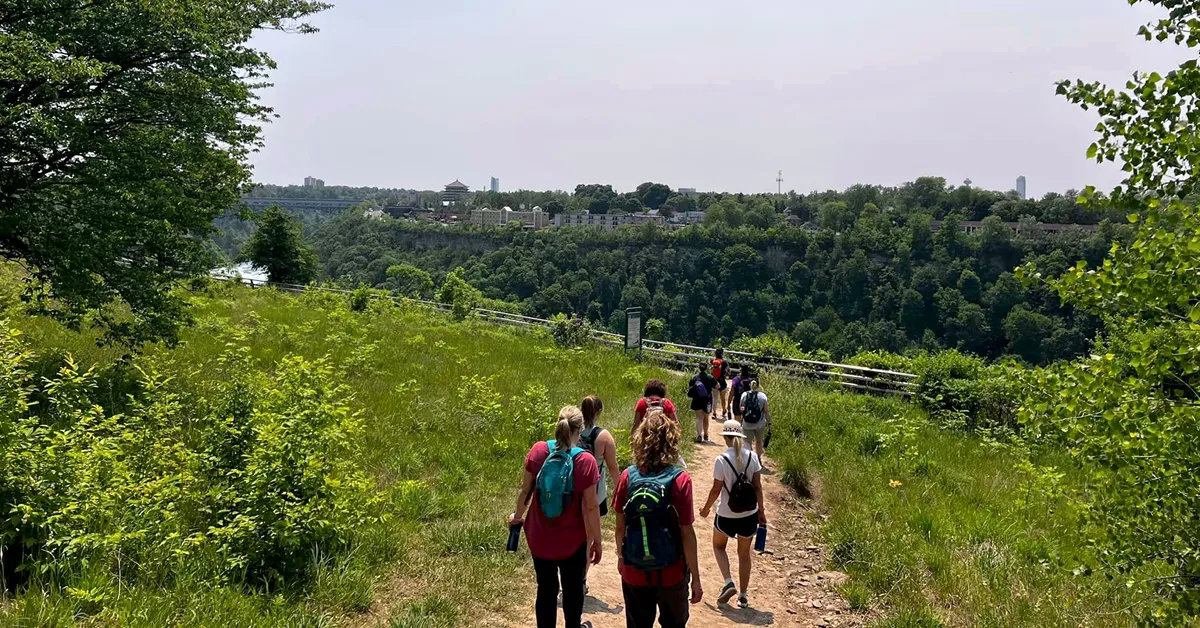
Hiking Tips for Adventures
To fully enjoy the benefits of hiking, preparation is key, not just for safety, but also for maximizing comfort, confidence, and enjoyment:
-
Pack the 10 essentials: A well-stocked kit includes a detailed map, reliable compass or GPS, sun protection (hat, sunglasses, sunscreen), extra insulation (fleece or jacket), headlamp or flashlight with spare batteries, a first aid kit, fire starter (matches or lighter), multi-tool or knife, high-energy food, and plenty of water.
-
Choose appropriate trails: Use your current fitness level and hiking experience to select trails that match your capabilities. Start with shorter, flatter routes and gradually work up to more demanding terrain.
-
Dress in layers and stay weather-aware: Check forecasts in advance, and wear moisture-wicking base layers, insulating mid-layers, and waterproof shells. Quick-dry socks and a hat are small upgrades that make a big difference.
-
Share your plan: If hiking solo, always tell someone your route and expected return time. Apps like Garmin InReach and Gaia GPS allow for live tracking and emergency communication.
Affiliate gear like ultralight multi-tools, solar-powered battery packs, water filtration straws, and electrolyte tablets from trusted brands such as LifeStraw, Anker, and Nuun help improve safety and performance. Navigation platforms like AllTrails and Gaia GPS also offer premium memberships with offline topographic maps, trail condition reports, and custom route planning, essential for maximizing both confidence and the many health-related benefits of hiking.
Conclusion
The benefits of hiking reach far beyond the trail. From better physical health and emotional wellbeing to deeper environmental appreciation, hiking enriches nearly every aspect of your life. Accessible, affordable, and endlessly rewarding, hiking is a powerful tool for transformation. With the right mindset and tools, your next hike could be your healthiest step forward.
>> Read More:

